Best Competitors & Alternatives to Didomi: 8 Options for 2024
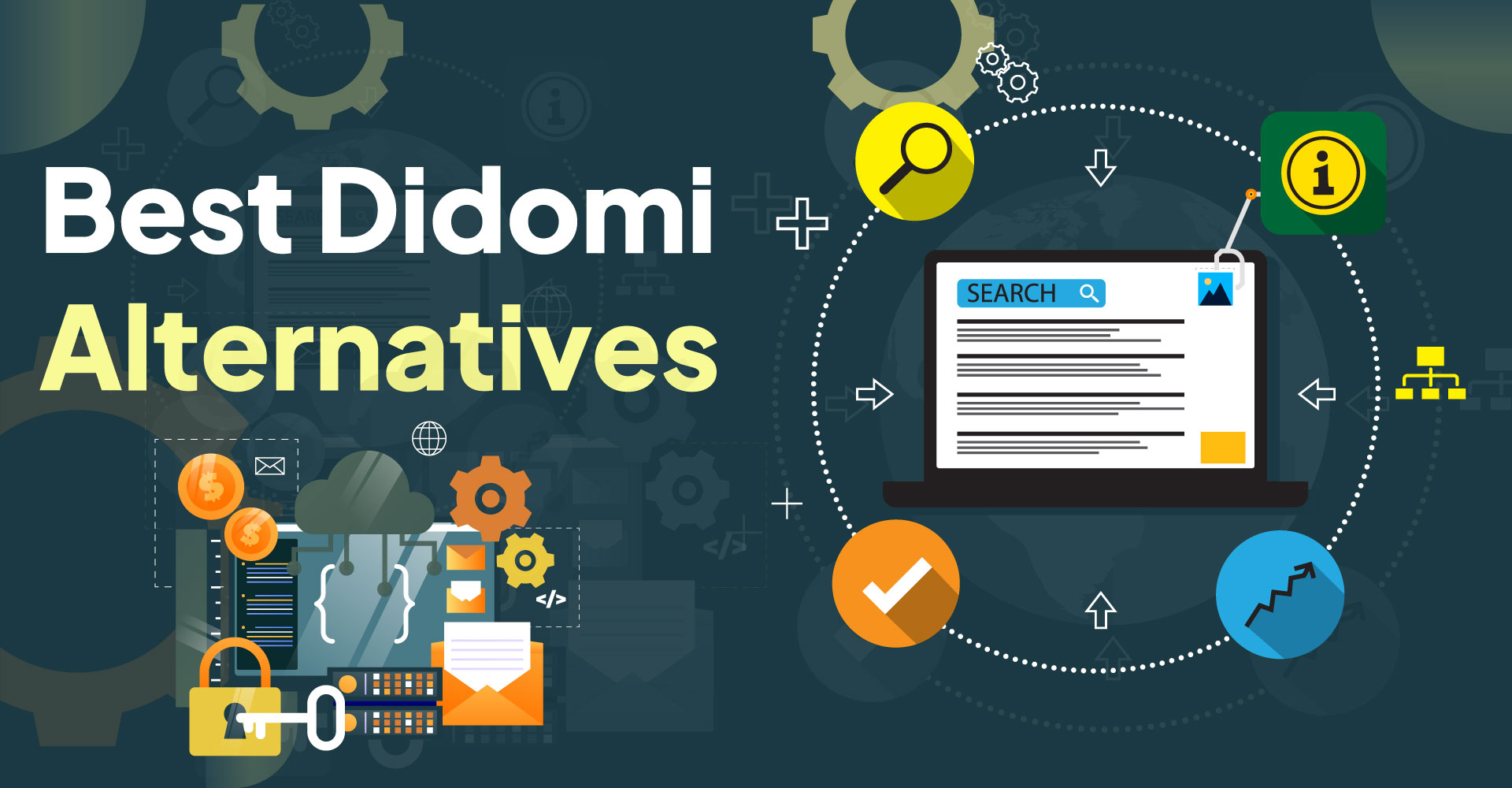
Table of Contents
Didomi is a consent management platform (CMP) and compliance management service. It helps businesses that operate on the Web – a global system that is fraught with regulations.
Any business operating on the Web is going to need to comply with a long list of requirements but they all boil down to a common set of rules. Didomi covers these legal obligations related to cookie consent and data usage.
If you run a website, you must implement a cookie consent system as a base minimum. If you store data on people, you must create a system that enables those people to see that information. You can also implement account preferences for regular site users. These are the tasks that Didomi helps you with.
Didomi isn’t the only business operating in the CMP field, and it is important to be aware of your options before you sign up for a service. In this review, we will look at the facilities offered by Didomi and then assess other companies that rival the platform in those services. So, let’s get started.
👉 Read more in our expert review of Didomi
Didomi Pros and Cons
Didomi competes in a crowded market. Its consent management services focus on cookie consent, and its DSAR system only covers records related to cookie consent. The platform doesn’t provide full compliance management because it doesn’t include any functions to detect the storage of sensitive data or implement its protection.
Pros of Didomi
The biggest advantage of Didomi is that it identifies third-party cookies and provides a way for businesses to move from cookie-based systems to a preference-based model.
The Didomi console is well planned and its screens are clearly laid out. The Customer Support team is knowledgeable and can be reached quickly via a live chat window, so no waiting for email replies.
Cons of Didomi
Didomi isn’t transparent about its pricing. The platform presents three plan levels and details the services included in each edition but why can’t the company be open about how much these services cost?
Investigations into the options of customers reveal that all is not rosy for those who sign up to the Didomi platform. The G2 system assessment website has 110 customer reviews for Didomi. Of those, 87 give the platform five stars – that’s a good ratio. However, the rest of the reviewers give the platform lower scores.
A big complaint is that the inclusion of the Didomi system in a website really slows the site’s response times. That slow performance can be fatal for commercial websites. Web servers know from searches that there are many providers in any field and will go elsewhere if pages are slow to load. A high bounce rate affects a site’s rankings in search engine results pages (SERPs).
This user explains the problem:
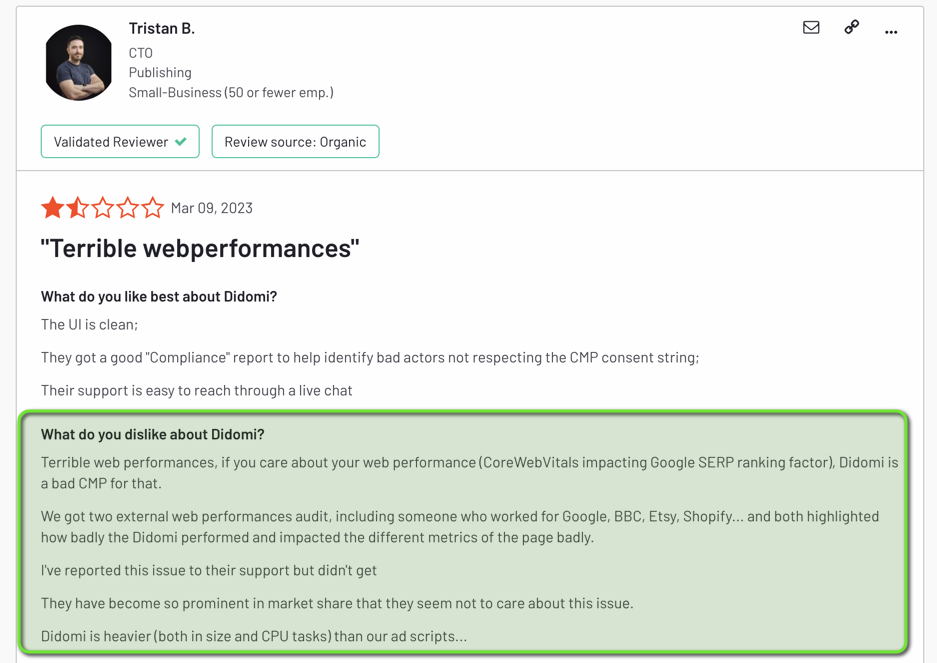
Selection criteria for Didomi alternatives
When looking for strong competitors to the Didomi platform, we considered these factors:
- A cookie consent service: This is the most essential service that a competitor should provide
- Third-party cookie detection: Third-party cookies can cause the most problems with compliance
- A compliance management platform: All functions should be performed on the provider’s servers
- Cookie consent banner options: Nice to have a choice of banner layouts
- A DSAR management service: The compliance platform should also hold all user records
- Preference management: Platforms that provide a method to collect user preferences and remove the need for marketing cookies
- International compliance: The consent platform should be able to detect the visitor’s location and adapt the cookie consent services accordingly.
- Transparent pricing: Preference will be given to platforms that openly list their prices
Using these requirements, we shortlisted eight Didomi alternatives and competitors.
1. Enzuzo
Enzuzo is open about its pricing, which is one of its biggest draws. The company even offers a free edition for startups. Another unique selling point for the platform is that it is a Google-certified CMP, fully compliant with Consent Mode V2.
Enzuzo's plans cater to a wide range of clients—there are six editions in total. The Free edition and the lower plans provide cookie consent management that competes well with Didomi's service. The cookie banners and policy pages that the Enzuzo package generates are available in 24 languages, which is ideal for international websites.
Advanced features
The DSAR management system is available in all editions, even the free service. However, the features in that package increase with higher plans. All paid plans discover third-party cookies on a website and block them. Site visitors are presented with the opportunity to allow cookies and then those cookies are unblocked. Cookies are categorized per purpose and so some cookies can remain blocked while others are allowed.
An agency edition caters to managed service providers and hosting systems. The plan has a multi-tenant architecture, which means that the service provider can let each client have a separate, secure subaccount.
The top plan, called the Enterprise edition, is a full GRC package that provides risk analysis, compliance management, and data governance. This service will scan your entire system for stores of sensitive data and map those locations. This is in addition to the website cookie scanning that is available in all paid plans. Sensitive data management functions comply with GDPR, CCPA/CPRA, and Quebec Loi 25, among others.
The free and paid plans both operate for one domain and all other editions allow a progressively higher number of sites to be managed: 4, 10, 20, and then an unlimited number in the Enterprise plan.

Onboarding and Customer Support
Enzuzo compares very well with Didomi in its customer-facing qualities. The system is very easy to set up, requiring just the insertion of a line of code in a website. The console is ghosted by Enzuzo and accessible through any standard Web browser.
The customer support team is more than the call center staff that many SaaS platforms try to get away with. Expert advice is included as standard, so new customers don’t have to hesitate when deciding whether to contact the support team.
That high quality customer service frequently features in customer reviews. The opinion of this small business director is typical of the reviews on the G2 platform:
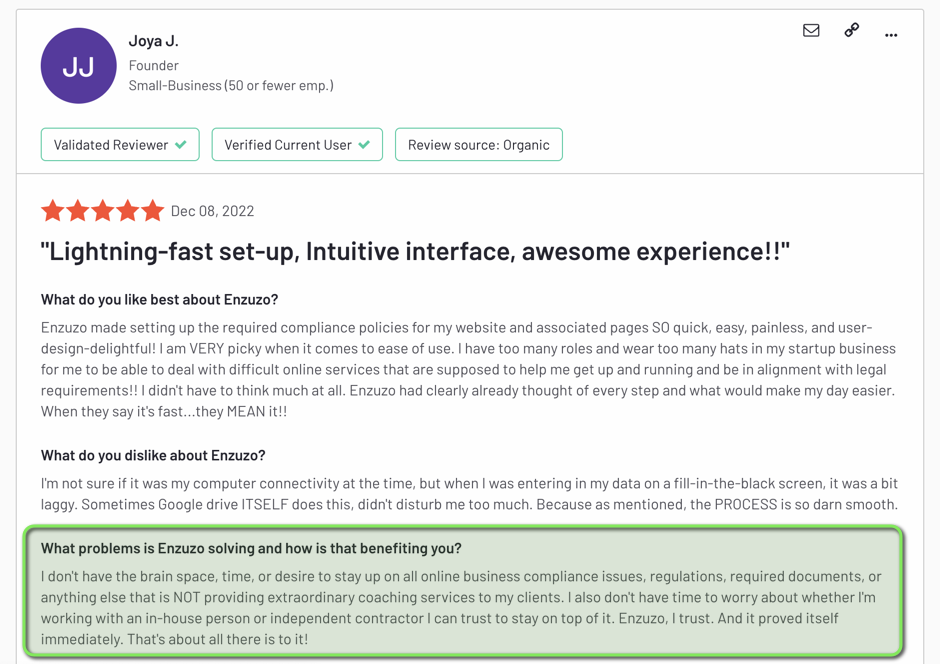
It is also notable that this user makes a particular note about the speed of Enzuzo. That is in stark contrast to the frequent complaints from Didomi’s users that the platform slows down the response times of their sites.
👉 Start powering your data privacy experience (no credit card required)
Ideal Partner for Agencies & Complex Websites
Enzuzo's platform is built to cater to the specific needs of agencies managing multiple clients and complex websites.
The platform's Agency plan, for instance, allows agencies to manage multiple domains within a single dashboard, simplifying the management process and providing a centralized hub for all compliance activities. With the introduction of Google Consent Mode, privacy compliance is now a revenue-blocking factor — and the last thing any agency wants is an irate customer wanting to know why they're not compliant.
Enzuzo's reseller program not only allows you to earn additional income by recommending it to your audience but also provides exclusive sales and marketing materials to attract more clients. Agencies partnering with Enzuzo also receive special access to a private Slack community to connect and network with industry peers.

Overall assessment
Enzuzo doesn’t offer a Preference Management unit, a function that is available on the Didomi platform. In that regard, Didomi is a better option. However, Enzuzo has a full GRC option, which goes way beyond the functions of Didomi in terms of data privacy standards compliance.
Didomi has an impressive product, but if you're looking to compare your options, Enzuzo is a solid choice. With better pricing, advanced features, and a product you can trust, Enzuzo is our recommended Didomi alternative.
Learn more about how Enzuzo can power your consent management and data privacy needs. Book a no-obligation, 1-1 call with a privacy consultant 👇
2. OneTrust
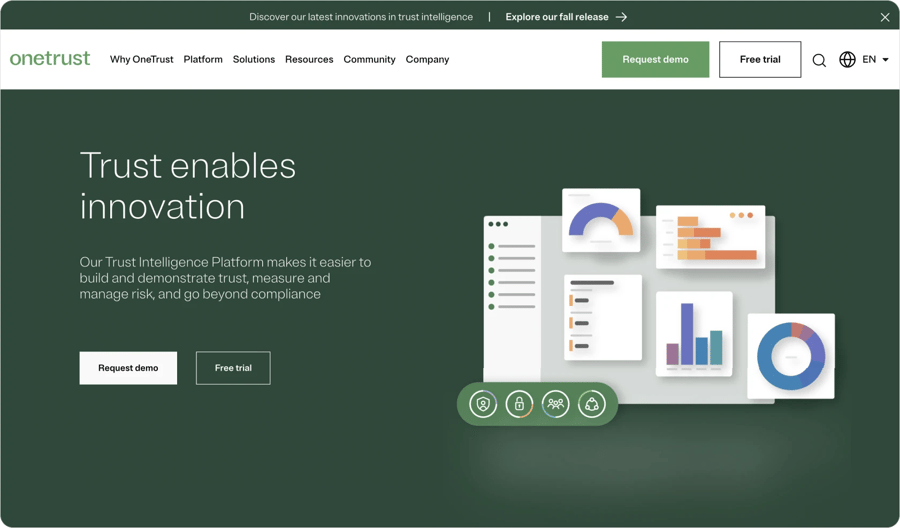
OneTrust is a very large platform of services that is a great deal more complicated than the other tools on this list. However, the comprehensive breadth of OneTrust has earned it the place as the most widely-used privacy management platform in the world. The cookie consent management tool in this vast platform is difficult to find and the company has created alternative brands to appeal to smaller businesses.
Pros
- Compliance with GDPR, CCPA/CPRA, LGPD, PIPEDA, PCI DSS, HIPAA, and SOX
- A DSAR management service that includes a user portal for communication
- Sensitive data management – including discovery and mapping
- Third-party risk assessments based on forms with a scoring system for responses
- Vulnerability analysis that produces guidance on fixes
- Compliance health score top measure progress toward compliance
- A Preference Management unit that compares favorably to the Didomi service
- Legal services available from an in-house legal practice
- Compliance training packages available for extra payments
Cons
- A confusing list of services – there are plans for small businesses and separate modules for large businesses
- Inconsistent pricing – the small business units have prices but the big business servers don’t
- Requires a “consultation” to get a system definition and that costs money
- Customizations and onboarding guidance are charged for and can be expensive
- Several brands offer the same services for different prices
- Data protection can be circumvented easily with USB sticks or printing hard copies
- The interface is difficult to navigate
Overall assessment
OneTrust caters to very large companies and will appeal to multinationals for sensitive data protection rather than to small businesses with websites that need a cookie banner. OneTrust runs the OneTrust Pro and CookiePro brands to compete directly with Didomi and Enzuzo.
This system provides much better compliance management than Didomi but for a much higher price.
3. Mine
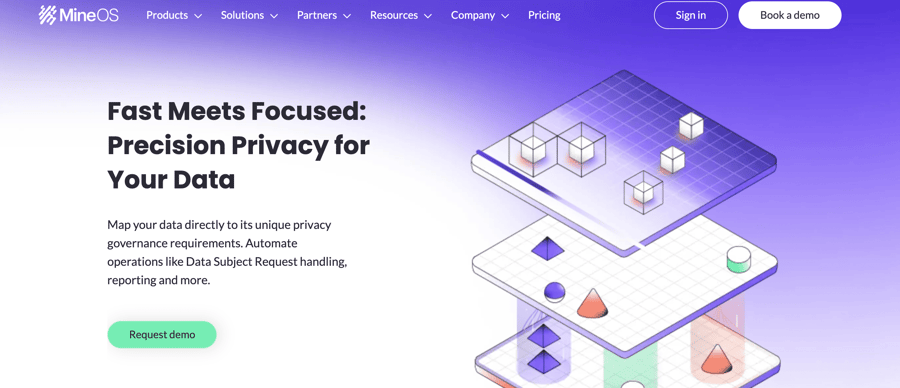
Mine provides a different perspective to data privacy management. In effect, this is a Preference Management system on steroids. Rather than providing a package for businesses, this is a subscription service for consumers. Businesses that associate with the service pledge to remove user data when directed by the Mine platform. The service could be regarded as an outsourcing service for data privacy management.
On the other side of the equation, the company has created MineOS, which is a data management platform for companies. It can be assumed that the companies that the general public is able to query so quickly are those that use the MineOS service. This is a data discovery and mapping service that makes tracing the data of each individual very easy.
Pros
- Channels DSARs, giving users the opportunity to request data removal
- Manages contact with multiple businesses as the representative of customers
- Data discovery and mapping service for companies
- Risk management for individuals
- A reporting mechanism for companies in response to a platform-wide request
- Provides the public with a form of discovery for private data storage locations
- Informs the general public about their rights
- Roots out data that is no longer relevant, which is a benefit both for companies and consumers
Cons
- No prices either for the consumer package or for the corporate system
- It can be assumed that only those companies that operate MineOS can respond to the public DSAR service
- Doesn’t help companies deliver DSARs for people who haven’t signed up for the Mine service
- Doesn’t help consumers to present DSARs to companies that don’t use MineOS
- The quality of service that companies on MineOS deliver relies on the plan level that each selects
Overall assessment
Mine is an interesting service that tries to play both sides of the field. However, its greatest success relies on attracting customers who have already dealt with the companies that have subscribed to the MineOS platform. Until all the companies and all the consumers in the world are on the platform, both sides of the Mine equation will get an incomplete service.
This service doesn’t offer a cookie consent management package.
4. Ketch
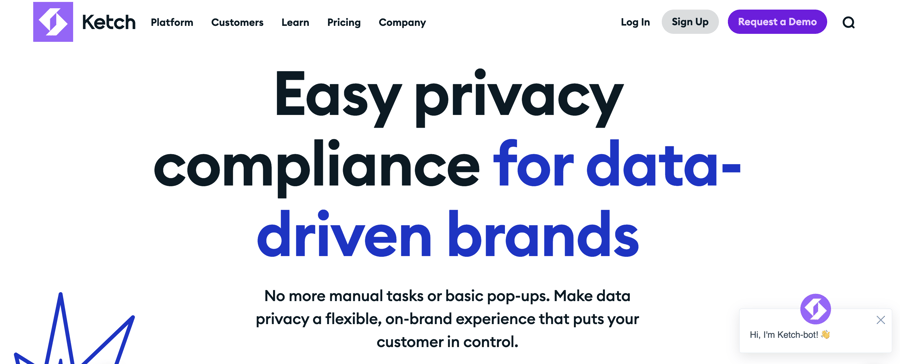
Ketch is a similar platform to Enzuzo because it has lower plans that offer cookie consent management and a higher plan that provides DSAR management and a preference management service. The first plan is a cookie banner service that is free of charge. The top plan is a full data privacy management service that includes sensitive data discovery and mapping.
The remarkable feature of the Ketch platform is Ketch for Developers. This enables Ketch data management systems to be integrated into custom software. This tool is only available with the top plain, which is called Ketch Pro.
Pros
- Cookie consent management included in all plans
- Generated policy pages for websites are included in all plans
- A preference manager that allows site visitors to state allowance for marketing communications
- Compliance with GDPR, CCPA/CPRA, LGPD, and VCDP
- DSAR management in the top plan
- Ketch for Developers –. a workflow orchestration system that can be integrated into custom programs
- Integrations with third-party tools for data management automation
- A free edition that is just enough to give startup websites legal cover
- A privacy impact analysis system included in the Pro plan
- Data discovery and mapping for PII
Cons
- No comprehensive price points for the two paid plans
- A starting price of $350 per month for the Ketch Essentials plan, which makes it one of the most expensive services on this list
- No cross-site consent storage – you have to repeat all of your consent management processes for each site and expect users to present multiple DSARs
- No third-party cookie discovery
- No automated cookie blocking – the system supplies APIs to enable you to implement that function yourself
- No foreign language adaptations or geolocation services
- Ketch for Developers is only available as part of the Pro edition
Overall assessment
The cookie consent service of Ketch is very basic and requires a lot of development work to implement functions such as cookie discovery and blocking. The big strength of this platform is its automation systems. That means workload automation, integrations with third-party systems, and its APIs for custom developers.
5. TrustArc
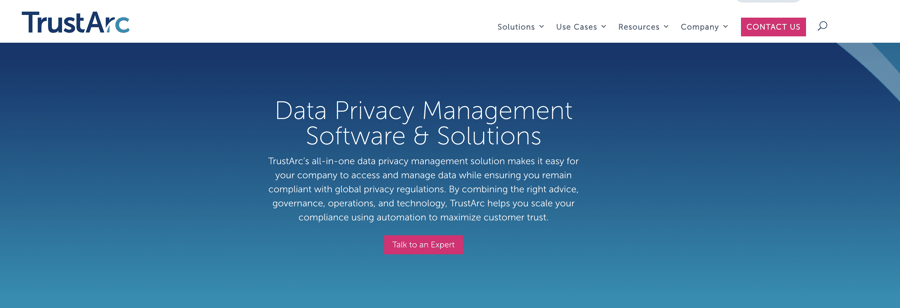
TrustArc is similar to OneTrust. Although it does include cookie consent management the platform is way bigger than that – its data privacy and compliance management services dominate the list of services provided by the system. TruswtArc is the second largest data privacy platform in the world after OneTrust. However, this is because it offers many more services than other systems on this list, such as Enzuzo, Ketch, or Drata.
Pros
- Cookie banners, consent management, and policy pages for websites
- This service is concerned with the use of PII and compliance with government regulations
- Compliance with GDPR (Europe), CCPA/CPRA (California), LGPD (Brazil), and PIPL (China)
- Sensitive data discovery, classification, and mapping
- A system risk assessment package that includes third-party risk management
- Website visitor location detection and adaptation of policy pages and cookie consent interfaces
- Third-party cookie scanning
- Cookie blocking by default with selective approval by category according to user preference
- Data location and processing location tracking for GDPR
- A preference management service for site visitors
- A DSAR management unit
Cons
- No prices are available on the TrustArc website
- Plans are not clearly defined
- Requires a consultation as part of the buying process
- Complicated onboarding that requires paid specialist assistance
Overall assessment
It is better to look at TrustArc in sections. The cookie consent management parts of the platform match well with the services offered by Didomi. The DSAR management and preference management services are also similar to the options available for Didomi. All of the rest of the TrustArc platform is a completely separate package that deals with data management issues – services that Didomi just doesn’t offer.
6. Drata
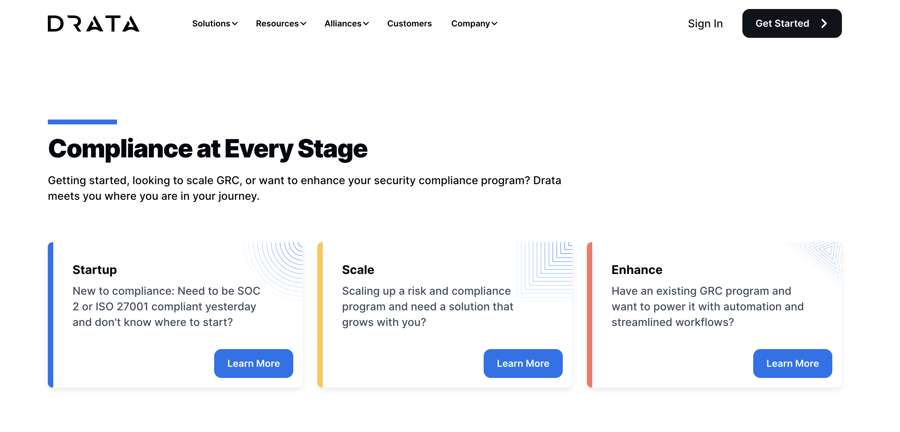
Drata is a compliance management platform, which makes it a different type of service provider to packages such as Didomi and Enzuzo. It is suited for businesses that are looking for greater compliance management features than what Didomi provides.
The platform presents a series of plans that relate to a buyer’s stage in compliance management implementation rather than their data volumes.
The package can also adapt to your own custom requirements, although that framework assembly process takes a lot of work. It is possible to implement multiple standards simultaneously.
Pros
- Compliance with more than 18 data privacy standards, including HIPAA, PCI DSS, GDPR, and CCPA/CPRA
- Compliance health scoring to mark progress towards compliance
- A system vulnerability scanner with guides on how to fix discovered problems
- Repeated security scanning when compliance is operational
- Expert assistance for onboarding
- Integration with third-party tools for workload automation
- Responsive customer service team
- Third-party risk assessments
Cons
- Doesn’t provide cookie compliance management
- No DSAR management
- No preference management
- No price list
Overall assessment
This package is similar to Ketch because it provides methods to audit processes and supervise operations to create and maintain standards compliance. This is a workload automation service that has a particular capability for data privacy enforcement.
7. Vanta
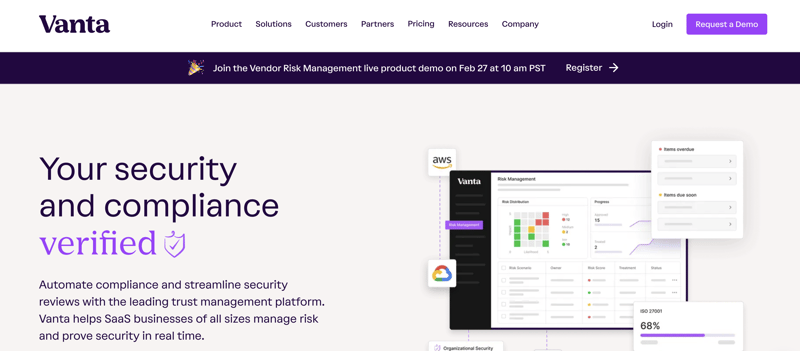
Vanta is a compliance management platform. It doesn’t compete with Didomi on cookie compliance and it doesn’t include a DSAR system or preference management tool. So, there are a lot of features in Didomi that you won’t find in Vanta. This package is similar to Drata in that it is all about getting a company into compliance and enforcing those standards.
Pros
- Compliance with GDPR, HIPAA, USDP, SOC2, ISO 27001, and NIST AI Risk Management Framework
- Risk management including third-party risk assessments
- System vulnerability scanning with recommendations for fixes
- Discovery routines that create hardware and software inventories
- Patch availability reports
- Employee activity assessments and best practices training
- A risk score that provides a measurement of compliance achievement
- Prioritized tasklists to achieve compliance
- Can plan for compliance with multiple standards simultaneously
Cons
- The Vanta website has a Pricing page without prices
- Available as a service on AWS with a starting price of $7,500 per year
- Can’t provide compliance controls for software that isn’t on its integrations list
- Identifies patch availability but doesn’t implement patching
- No automated remediation for security weaknesses, they have to be implemented manually
- No routines for sensitive data discovery or protection
- No cookie banners
- No DSAR management services
- No preference management service
Overall assessment
Vanta is a system vulnerability service, risk assessor, and workload automation package designed to enforce compliance. It doesn’t actually provide any compliance frameworks, such as a DSAR portal or data discovery routines. Instead, the package provides integrations to other tools, so you would construct those services in other packages, and they would log activities to Vantsa for compliance reporting.
8. Securiti.Ai
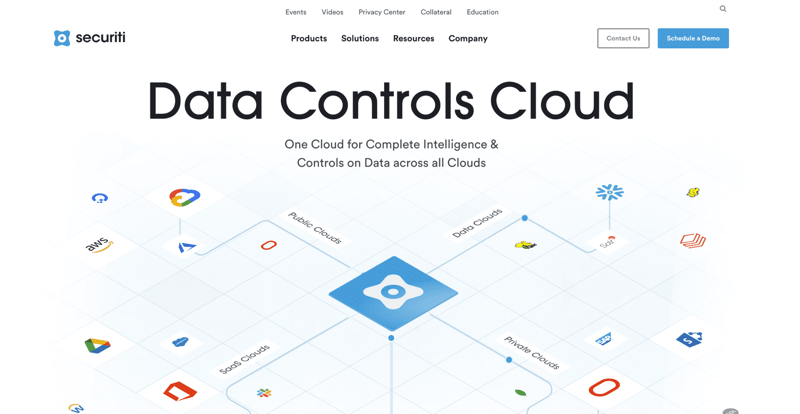
Securiti.ai is a data protection platform that provides routines to discover sensitive data and control access to it in order to enforce data privacy standards. This package competes with Didomi on functions that deal with external users, such as cookie banners, preference management, and DSAR processing.
Pros
- Discovers sensitive data including shadow copies, categorizes instances, and provides a data inventory
- A vulnerability scanner that identifies configuration errors and out of date software
- Data access tracking for controls and logging for compliance auditing
- Integration with data handling and management tools including Oracle, MongoDB, Google BigQuery, and Apache Hadoop
- Includes control of cloud services, including applications and data stores
- Manages file access in a granular manner rather than blocking it outright
- Provide cookie banners, cookie scanning, and cookie blocking
- Offers a PRivacy Center system that enables users to record their system and marketing preferences
- DSAR management is integrated into the Privacy Center
Cons
- Relies on application access controls and limits side-access opportunities
- No price list
Overall assessment
This platform includes consent management for website visitors and also provides workflows to handle DSARs. These functions are implemented through an interface called the Privacy Center, which is a slick package and beats the Preference Management interface offered by Didomi. The tool implements all of the services offered by Didomi and competes well. However, Security.ai doesn’t present a price list, which makes direct comparisons for those services difficult.
The sensitive data management functions of Securiti.ai are services that Didomi doesn’t offer.
Didomi’s services
Didomi is a cloud-based platform that provides services for your site as a remote system. That means you don’t need to download any software and run the CMP yourself. Instead, the Didomi service scans your site and adds in its cookie consent banners when you insert a line of code into the website’s HTML.
The four categories of services that Didomi offers are:
- Global Consent Management
- Data Privacy Requests
- Compliance Monitoring
- Preference Management
Let’s look at what each of these services does.
Global Consent Management
This is the core service of Didomi’s platform and forms the major part of the Didomi Consent Essentials plan. The visible product of this service is a cookie consent banner. This is a requirement for many data protection standards around the world.
Cookies can contravene CPRA, GDPR, CPA, CCPA, UCPA, and Quebec’s Law 25 if they are not handled properly. The Didomi plug-in can detect the visitor’s location and present the appropriate banner. This service is very closely linked to the Compliance Monitoring unit on the platform – you wouldn’t use one without the other.
The Didomi console gives you the opportunity to design your own consent banner, within certain parameters. You can even add in your site’s logo. The consent management service will apply to a website, a mobile app, or a TV set-top box.
If you operate your service across platforms, the Didomi system records the visitor’s consent once and then applies that consent to your presentation on all channels. Didomi maintains these consent records, so you don’t get the complications of having to ensure that your storage space is compliant.
Compliance Monitoring
There isn’t anything wrong with storing a cookie on a visitor’s computer, in fact, most website functions rely on that mechanism to store activity records between pages. However, the tracker cookies that many third-party services download present privacy challenges.
You probably don’t know about the full activity of those handy services that you integrate into your site. You probably don’t realize that the cookies they store could get you into trouble if you don’t give the site’s visitors the option to block them. The Compliance Monitoring module of the Didomi platform scans your code and discovers those third-party cookies. It knows what to look for because the service maintains a list of the code inserts that these systems regularly use.
The platform will block those third-party cookies unless the visitor approves them.
Data Privacy Requests
This module deals with what is commonly known as a “data subject access requests,” or DSARs. The people that you hold data on have the right to know exactly what information you have and they can also correct errors. The data you hold relates to cookie consent and it isn’t actually held by you – it is on the Didomi server.
The DSAR service includes an access request for, a search of records to find a match for a given name and a report format that automatically responds. Effectively, you don’t need to spend any time on DSARs, thanks to this system.
The base plan of Didomi doesn’t include DSAR management. You have to move up to the Core Privacy UX edition for this feature. The top plan, which is called Privacy UX Plus, also includes the DSAR management module.
Preference Management
User preference isn’t a requirement of data privacy standards. However, it is a development of user consent that has evolved in response to data privacy legislation. It is a more consumer-friendly way of getting the permission of users to provide various services, which might otherwise be regarded as pestering.
The main purpose of this option is to get permission from site visitors to send them proportional information either by email or by SMS. This is an “opt in” method, rather than the implicit “opt out” of a typical consent-style form. With preference records, a site doesn’t need to sneak marketing cookies onto a user’s computer.
Preference Management is included in the Core Privacy UX and Privacy UX Plus editions.

Stephen Cooper
Stephen Cooper started out in IT as a programmer, became an international consultant, and then took up writing. Whether writing code, presentations, or guides, Stephen relies on his degrees in Computing, Advanced Manufacturing, and Cybersecurity to generate solutions to modern challenges.
